You may have heard some negative opinions about WordPress from misinformed tech consultants or influencers. This can be confusing for beginners who see conflicting views.
It’s essential to ask: if WordPress is so bad, why is it so popular? Nearly half of all websites on the internet use it.
In this article, we’ll discuss whether WordPress is really bad and what you should know before using it. We’ll look at its strengths and weaknesses to give you a clear picture.
Let’s explore the truth about WordPress and why it remains a top choice for many.
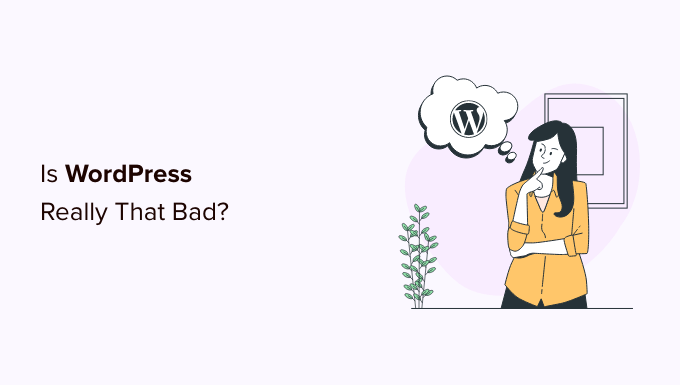
Is WordPress Really Bad?
The short answer is ‘No.’ It’s not.
WordPress is the world’s most popular website builder. Over 43% of all websites on the internet use WordPress, according to the market share report.
This includes big-name brands like Sony, CNN, Time Magazine, and Disney.
If WordPress were truly bad, it wouldn’t be so popular among users and major companies worldwide.
People who think WordPress is a bad option usually cite the same reasons. Many of their arguments are developer-centric and beyond WordPress’s intended purpose.
Let’s look at some of the reasons they give when claiming that WordPress is not good.
- WordPress is Not Secure
- WordPress is Only Good for Blogging
- WordPress Code is Sub-Standard and Outdated
- WordPress is Used by Amateurs
- WordPress is Not Scalable
- WordPress is Not Beginner Friendly
- There is Limited Support Available for WordPress
- WordPress is Not Suitable for Ecommerce
- Future of WordPress is Unclear Because it is Free
- Getting Started with WordPress
1. WordPress is Not Secure
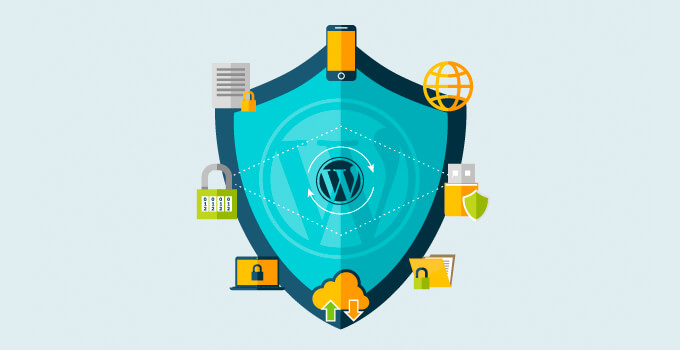
One of the most common arguments some developers present is that WordPress is not a secure platform for building mission-critical websites.
This is a myth.
Contrary to these claims, WordPress is a very secure and transparent platform.
As open-source software, WordPress code is always available for anyone to study and find security issues.
Because it is monitored by security experts worldwide for vulnerabilities, this code is one of the most thoroughly scrutinized in the world.
Thousands of developers from many countries contribute to the WordPress code, and the software is deeply tested for security issues.
As an open-source platform, WordPress is open to any customization. This allows individual website owners, agencies, and developers to make their websites even more secure.
This can be done by installing a security plugin or using a WordPress firewall. These block the most common threats and make your website more secure.
Third-party developers maintain WordPress themes and plugins. Many premium WordPress plugins and theme companies pay security experts to audit their code.
If a security vulnerability is found in a popular WordPress plugin or theme, it is often patched very quickly, and depending on the severity, the WordPress team even pushes automatic security updates where applicable.
For more details, see our WordPress security guide, which shows how to make your WordPress website even more secure properly.
2. WordPress is Only Good for Blogging
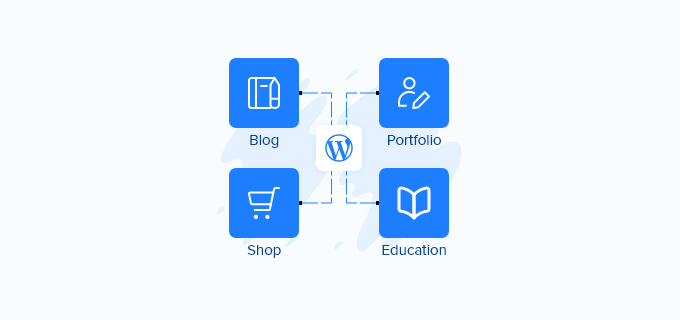
WordPress is by far the best blogging platform on the market. It started out primarily as a blogging tool, but it still makes it super easy to start a blog.
However, over the years, WordPress has grown into a CMS (content management system) and a powerful platform for building almost any type of website.
WordPress is the go-to software for small business websites.
WooCommerce, a WordPress plugin, is the #1 eCommerce platform to build an online store, even over popular competitors like Shopify or BigCommerce.
Plus, you can make membership websites, sell online courses, run an online marketplace, and much more.
These days, developers are using WordPress as the web operating system and even building SaaS applications like OptinMonster, mortgage calculator apps, auction websites like eBay, multivendor marketplace sites like Etsy, and more.
3. WordPress Code is Sub-Standard and Outdated

Another argument commonly used is that WordPress coding standards are not that good and that they are outdated.
This reason is commonly given by developers who don’t often work with WordPress websites.
WordPress software code is simple by design to allow for wide adaption. That isn’t an issue but rather a very intentional feature. This simplicity provides more users with an easy point of entry.
Over the years, WordPress has gotten so easy that even non-techy users can build websites without knowing any code.
This has put some developers out of business. It’s in their interest to bad-mouth WordPress so they can sell customers more complicated services that they don’t need.
We believe that WordPress code is standardized, robust, and provides a solid foundation without getting overly complicated.
It offers robust APIs, allowing developers to build their applications and solutions on top of WordPress.
4. WordPress is Used by Amateurs
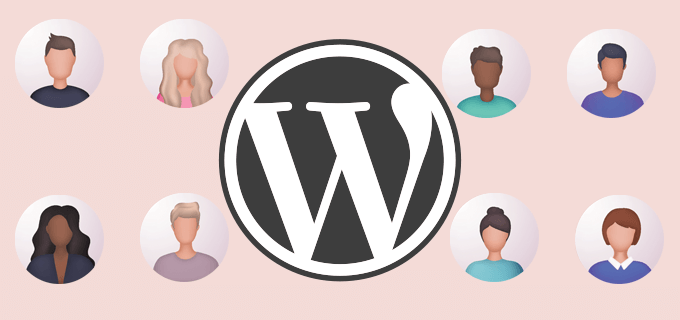
Again, this reason is given by people who don’t know the scope of the platform and are unfamiliar with the history of WordPress.
WordPress aims to democratize publishing and allow more people to make websites easily.
Again, this is by design and a conscious decision to make WordPress easy for as many people as possible.
The WordPress community is massive and consists of users at all levels, from first-time site owners to large corporations, government agencies, non-profits, developers, and business users.
The project prides itself on being the software of choice for millions of small businesses, hobbyists, independent publishers, bloggers, and more. It should not be seen as a concern that amateurs use WordPress. The platform is built for that.
But it’s also used by large brands and even big governments. For example, Whitehouse.gov (United States government website) is built with WordPress.
5. WordPress is Not Scalable

Scaling refers to handling a growing volume of traffic as a website expands.
Some developers believe that a WordPress website is harder to scale. We have found this argument to be untrue.
Here is our case study of how we made WordPress faster than static site generators.
A WordPress website needs web hosting just like any other website.
You need more server resources to handle the traffic as your website grows. This is the case for all website builders and not just WordPress.
We have seen WordPress websites on low-cost shared hosting servers effortlessly handling very hefty traffic volume.
With WordPress, you can utilize your server resources much more efficiently than any other website builder and custom-coded websites.
WordPress can utilize your hosting server’s built-in caching mechanisms. Even a beginner-level WordPress user can install a caching plugin to reduce server load immediately.
You can easily offload your static files and media to a CDN network. You can even go further and offload services like email to SMTP services.
Thousands of WordPress websites have very high traffic volumes and perform exceptionally well.
For more on this topic, see our answer to the question: how much traffic can WordPress handle? In this explainer, we also shared tips on scaling WordPress.
The best part is that even beginner-level users can make these enhancements to scale their websites as their traffic grows. See our complete WordPress performance & speed handbook for practical, step-by-step instructions for beginners.
Anyone that claims WordPress is not scalable doesn’t have the technical experience. We scale billions of impressions each month across our WordPress platform.
Take a look at the WPBeginner case study about how we scaled this website while maintaining speeds faster than static websites.
6. WordPress is Not Beginner Friendly
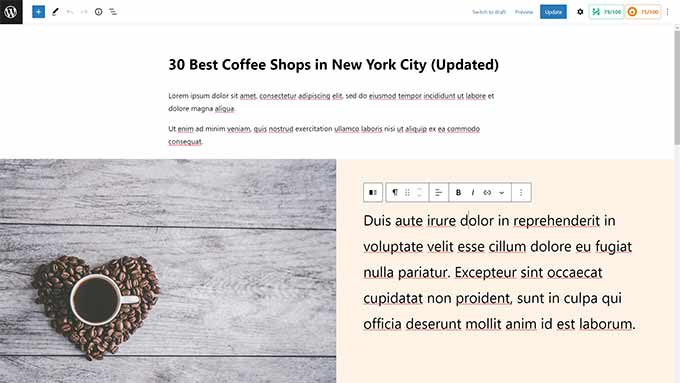
Some people claim that WordPress is bad because it is not beginner friendly.
This argument can be used against any software or tool.
WordPress has a slight learning curve, like any other software you use. You’ll need to spend some time to find your way around.
If the popularity of WordPress is to be taken as an indicator, we don’t think WordPress would have been the most used website builder if it wasn’t beginner friendly.
Many significant updates to the WordPress core files aim to make the platform more user-friendly as time progresses.
For example, introducing the block-based content and site editor that works similarly to many popular site builders like Wix or Squarespace.
Tip: You can try it yourself by following our learn WordPress in a week roadmap for beginners.
At WPBeginner, we write about WordPress for beginner-level users and have been doing that for over a decade.
In our experience, WordPress beginners quickly get over that initial learning curve and become quite good in just a few weeks.
There are also numerous WordPress page builder plugins available like SeedProd, that make it easy for you to build any type of website without writing any code.
WordPress also has over 60,000+ free plugins that allow you to add new features to your website, such as contact form, analytics, eCommerce, and more, without any code.
There are even no-code workflow automation plugins like Uncanny Automator that help you save time when managing your WordPress site.
You may want to see our expert pick of the must-have WordPress plugins for all websites.
7. There is Limited Support Available for WordPress

Another argument that we come across is that WordPress is bad because there is limited support available.
This argument comes when users don’t know how to get WordPress support.
As free software, WordPress is available and maintained by a community. The support is also community-driven.
There are the official WordPress.org support forums where you can get support from other users.
Then, there are WordPress resource sites like WPBeginner that publish many WordPress resources to help beginners.
There are also free Facebook groups like WPBeginner Engage, where you can post your questions and get free help from moderators and other users. The group has over 96,000+ users.
Because WordPress is so big, there are dedicated WordPress sections and groups on all popular online communities like StackExchange, Reddit, LinkedIn, and more.
Not looking for community options?
There are thousands of WordPress developers that you can hire on platforms like WPBeginner Pro Services, Seahawk, Codeable, Upwork, Fiverr, Toptal, and more. You’ll find expert WordPress support on hourly rates or fixed-price gigs there.
8. WordPress is Not Suitable for E-commerce

Indeed, WordPress does not come with a built-in shopping cart or eCommerce features out of the box. You’ll need a plugin to make an eCommerce website with WordPress.
However, saying that WordPress is unsuitable for eCommerce is unfair, especially when WooCommerce (a WordPress plugin) is the most used eCommerce platform globally.
It is used by more online stores than Shopify, Magento, OpenCart, and PrestaShop combined.
It is open-source, like WordPress. However, unlike the WordPress core, it is run by a company that uses different ways to monetize the platform.
You can also extend your online store with thousands of available WooCommerce add-ons.
Aside from WooCommerce, there are several other eCommerce plugins for WordPress, including:
- Easy Digital Downloads allows you to easily sell digital files like eBooks, music, art, software, and others using WordPress.
- MemberPress makes it easy to sell premium content and courses in WordPress.
- WP Simple Pay makes it easy to accept payments on your WordPress site for any product or service without adding a full-blown cart.
- WP Charitable is a donation and crowdfunding platform that makes it easy for you to accept donations in WordPress.
9. The Future of WordPress is Unclear Because it is Free

Some believe that WordPress is bad because it is available for free. Those folks say that makes its future path unclear.
This argument is untrue and is often used by people who don’t know why WordPress is free.
The trademark ‘WordPress’ is owned by the WordPress Foundation, a non-profit organization. The foundation’s mission is to promote WordPress beyond contributors so that it remains available for everyone to use.
Apart from the non-profit foundation, there is also a multi-billion industry behind WordPress.
This includes many top WordPress companies, web development agencies, independent businesses, website owners, developers, designers, technicians, marketers, and more.
Even if development stops on WordPress, as open-source software, it can be easily forked into another project and continue with a different name.
However, we do not believe that this is going to happen.
But it can, which is why the future of WordPress is promising, mainly because of its freedom.
We discussed this topic in more detail in our article on the future of WordPress, which included our expectations and predictions.
Getting Started with WordPress
The easiest way to learn more about WordPress is by using it yourself.
While you can install WordPress on your computer (Windows, Mac), making a live website is the best way to experience it.
You’ll need a website hosting account and a domain name to get started.
Now, if you are worried about the costs, you can take advantage of the special deal that Bluehost offers.
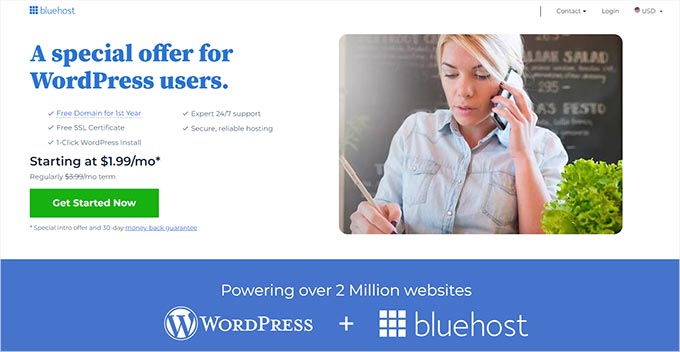
They are one of the biggest hosting companies in the world and an officially recommended WordPress hosting provider.
They offer a generous discount to WPBeginner users with a free domain name and SSL certificate. You can get everything you need to get started with WordPress for just $1.99 per month.
Aside from Bluehost, you can also use other hosting providers like Hostinger or SiteGround, which makes getting started easy.
For more details, see our complete guide on how to make a WordPress website, which has step-by-step instructions for beginners.
We hope this article helped you see how good or bad WordPress is. You may also want to see our complete WordPress review or our article discussing why you should use WordPress.
If you liked this article, then please subscribe to our YouTube Channel for WordPress video tutorials. You can also find us on Twitter and Facebook.





Samuel
I was a victim of most of what were discussed here, because at the initial stage of my career as a web developer I was considering the option between wordpress and joomla but because I listened to rumours being pestle around by ignorant web practitioner and blogger alike back then, I didn’t even bother to check for myself and I went for joomla. Joomla is a very good content management system but years down the line I have to come to embrace WordPress having realise it’s popularity and the edge it has over other web builder platform. Today, I have embraced Wordpress and I have even realised that it is more users and beginners friendly and offer more features you wouldn’t find in other platforms.
Mrteesurez
I can also sense another myth here that “WordPress have limited support”. If you just type and search “how to start a WordPress site” on either Google or Youtube, you will see thousands of guides, videos, forums, and more, even WPbeginner is a great example in this aspect.
In term of future, nobody can fully predict what will happens especially in the ever evolving technology, AI and more.
All CMS, Programing language and even developer himself has a concerned to this.
Moinuddin Waheed
I have heard the same arguments from developer community specially on YouTube about this that WordPress is vulnerable to security and only beginners use it.
But when I see the stats and find the nearly half of all the websites are on wordpress, I find those arguments contradictory.
How can a platform be used by so many people if it is vulnerable to security and have limited uses.
wordpress is and will be used by millions in the future as well and will remain no matter what because of its usability.
WPBeginner Support
We go over the security concerns in the article but the main reason people hear about the concerns is because WordPress is used by as many sites as it is
Admin
Jiří Vaněk
It’s an absolute misconception that only beginners use WordPress. In the Czech Republic, several government websites are built on WordPress, including the website for the online sale of highway toll stickers, all under the auspices of the state. Development firms with budgets in the millions created these websites. Despite that, WordPress was chosen over a custom-built platform. And don’t be mistaken, while many initially laughed at the idea, these websites still function flawlessly to this day.
Jiří Vaněk
WordPress can only be as bad as its owner makes it. I know many people who complain about WordPress and its speed. However, the problem in the vast majority of cases lies in optimization—too many plugins, no updates, and much more. Currently, I consider WP as one of the best and user-friendly systems for website creation.
WPBeginner Support
Thank you for sharing your opinion
Admin